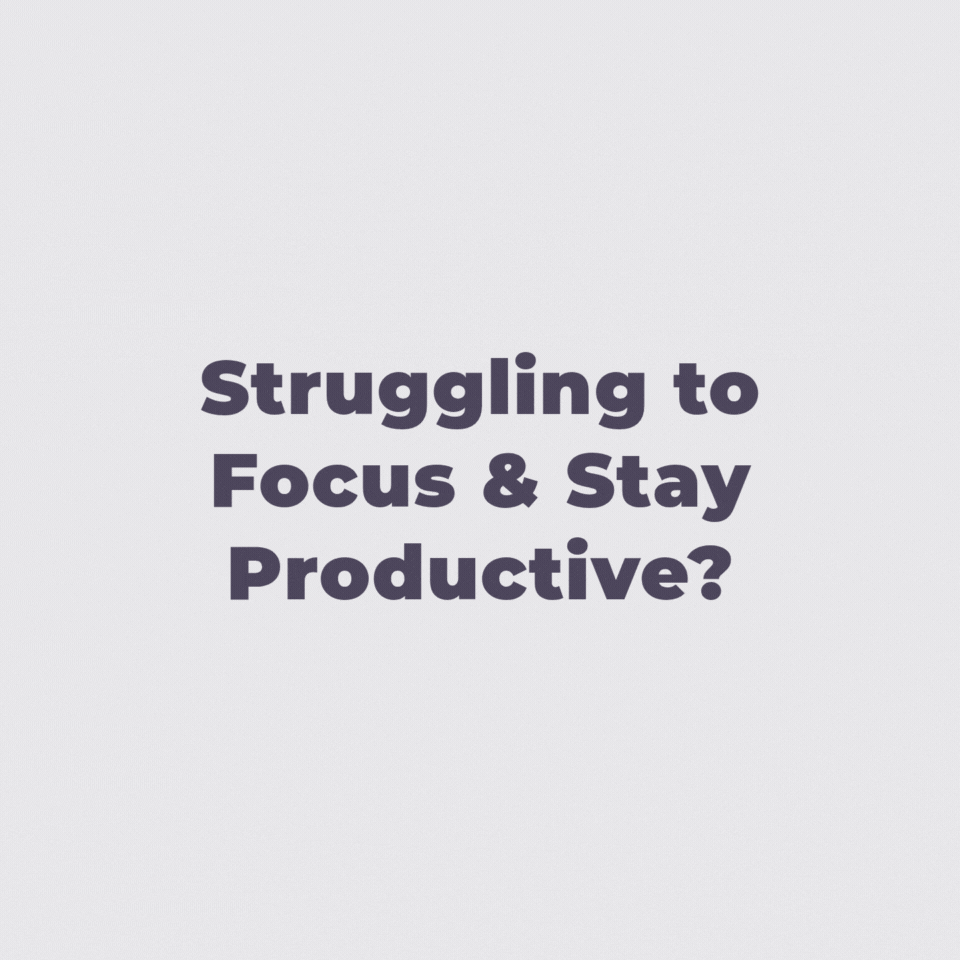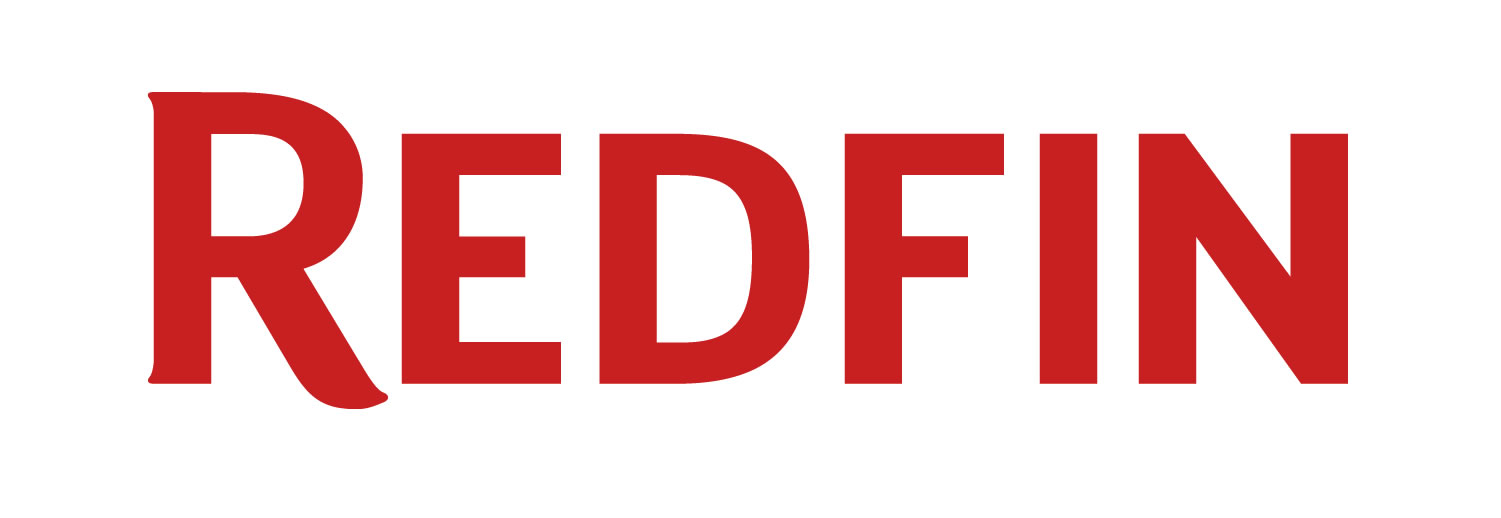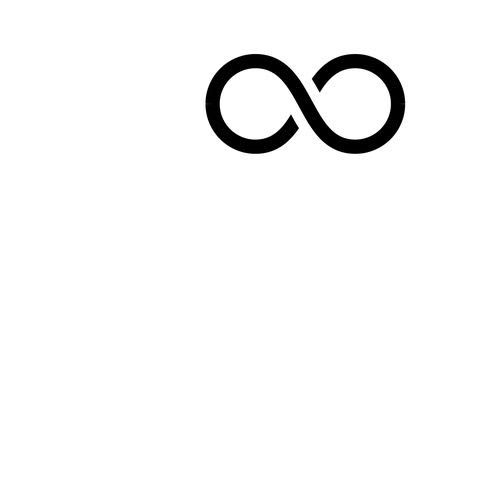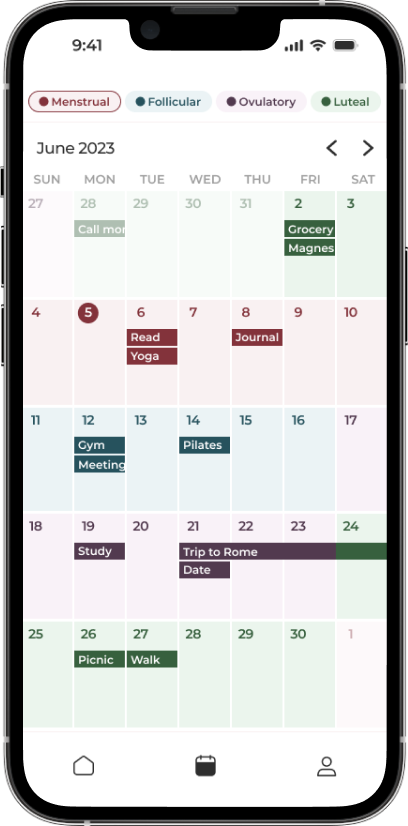1:1 Life Coaching Sessions for High Achievers.
You didn’t come this far to only come this far. Break through mental blocks, make clear decisions, and take action.
Intro
Life Coaching Focus
-
Read blog
Personal Development Coaching
Unlocking potential through self-discipline, accountability, and goal-setting.
-
Read blog
Career Coaching
Personalized support to navigate your career path through goal-setting and making strategic decisions for professional growth and fulfillment.
-
Read blog
Motivation Coaching
Guiding you to uncover your passion, build lasting motivation, and create meaningful momentum toward your goals.
Values
-

Results-Driven, No Extra Fluff
Receive actionable value from the first call.
-
Personalized Solutions
Sessions are tailored to your unique needs.
-

Empowered Autonomy
I guide you to clarity, not tell you what to do.
-

Strict Confidentiality
Our sessions are held in strict confidentiality.
Portfolio
-
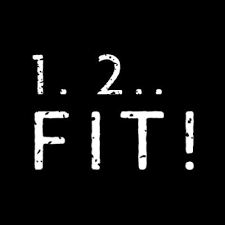
Motivation Coach
1.2..Fit!
At 1.2.Fit, a business that creates fitness and nutrition programs for women, I worked directly with clients to help them follow through on their health goals. My role focused on supporting women as they moved through the program—keeping them encouraged through meaningful conversations.
May 2024 - August 2024
Nutrition & Fitness
-

Success Coach
Digital Car Dealer
At Digital Car Dealer, Spain's top academy for entrepreneurship in car flipping, I support students in their mental and emotional development as they progress through the program. I work on strengthening their entrepreneurial mindset so they can sustain motivation and avoid becoming paralyzed by uncertainty.
May 2025 – Present
Entrepreneurship
Qualifications
-
134+
Clients
who reached their goals
-
341+
Sessions
conducted with clients
-
3+
Years
of experience in life coaching
-
12+
Countries
where my clients are located
-
Intro to Psychology
Yale University (online)
-
Life Coaching
Learndrive Education
-
Business Growth
Stanford University (online)
-
Emotional Intelligence
Alpha Academy
Testimonials
Oscar
I came into contact with Chiara about a year ago when I was having a lost period in my life, I had a lot of confused thoughts bouncing around in my head and couldn't get myself out of this. We started by having 2 conversations every week where slowly but surely we moved forward and gradually I saw a light in all the darkness and started to feel better. Chiara is an exceptionally good listener who truly understands human psychology on a deeper level. She doesn't judge anyone for anything and when she talks it's like an angel sent from heaven with a message. I recommend anyone who is stuck in life in different ways to try a few conversations with Chiara to see if she can open up new thought patterns and come up with messages that help. For me, she will always have a special place in my heart.
Jonas
Chiara is kind and understanding, and very good at listening, yet at the same time has great opinions that she knows how to express and are very insightful. She understands that problems can be complex and not black or white, and helps you navigate difficult situations and find solutions to problems. She has helped me recognise important truths that I wasn’t aware of, and I am so greatful for that! Whatever your problems are, or goals that you want to achieve, Chiara is a great partner by your side!
Gemma
Paloma has helped me in different moments and aspects of my life. I feel that with her, I can talk about anything without feeling judged, and she helps me delve deeper and understand many of the concerns I have. She helps me move from a cloud of thoughts to something more concrete, so I can truly find possible solutions and take actions to improve my life. Regarding my relationship, she also helped me identify the origin of many fears, needs, disagreements... to reflect on them from self-awareness, empathy, but also by setting boundaries and affirming my self-worth as a person. I wholeheartedly recommend her services because you will truly see results.
FAQs
-
Yes, life coaching can be highly effective for individuals seeking personal growth and positive change. Through personalized guidance, support, and accountability, life coaches empower clients to clarify their goals, overcome obstacles, and achieve meaningful results. However, success ultimately depends on the client's commitment, openness to change, and active participation in the coaching process. Read blog
-
Yes, a life coach can help people with anxiety by providing guidance, support, and tools to manage and reduce anxiety symptoms. They can help clients develop coping strategies, implement stress-management techniques, and work towards building resilience and a more balanced lifestyle. However, it's important to note that severe or clinical anxiety requires the expertise of a mental health professional. Read blog
-
Yes, life coaching can be beneficial for individuals experiencing depression by offering support, motivation, and strategies to improve their overall well-being. While they can provide guidance in areas such as goal-setting, mindset shifts, and self-care practices, it's important to note that severe or clinical depression should be addressed by a qualified mental health professional who can provide appropriate treatment and therapy. Read blog
-
Yes, a life coach can help individuals improve their relationships by providing guidance, communication strategies, and tools to enhance connection and understanding. They can assist in identifying patterns, improving communication skills, and fostering healthier dynamics, ultimately supporting clients in building stronger and more fulfilling relationships. Read blog
-
No, a life coach cannot act as a therapist as they have different roles and qualifications. While life coaches focus on personal development, goal-setting, and accountability, therapists are trained mental health professionals who provide diagnosis, treatment, and therapy for various mental health conditions. It's essential to seek the appropriate professional based on your specific needs. Read blog
-
While it is possible to engage in self-coaching practices and personal development, having an external life coach can provide valuable perspective, accountability, and support. A life coach offers an objective viewpoint, specialized expertise, and guidance that can enhance the effectiveness and depth of the coaching process, facilitating greater personal growth and transformation. Read blog
-
A life coach can provide personalized guidance, support, and accountability to help you clarify your goals, overcome obstacles, and reach your full potential. They can assist in identifying limiting beliefs, creating action plans, and fostering personal growth in various areas of your life. Ultimately, a life coach can empower you to make positive changes, gain clarity, and achieve meaningful results. Read blog
-
No, a life coach does not typically provide specific guidance or expertise in weight loss. While they can offer support in setting goals and maintaining accountability, for weight loss purposes, it is generally more effective to consult with a registered dietitian, nutritionist, or fitness professional who can provide specialized guidance and expertise in nutrition, exercise, and weight management. Read blog
-
Yes, a life coach can help individuals improve their confidence by offering guidance, tools, and techniques to develop self-belief, overcome self-doubt, and cultivate a positive mindset. Through personalized strategies, support, and accountability, a life coach can empower individuals to build and sustain confidence in various areas of their lives, leading to personal growth and greater success. Read blog
-
Life coaching works by establishing a collaborative partnership between the coach and the client. The coach guides the client through a process of self-discovery, goal-setting, and action planning. Through active listening, powerful questioning, and providing support and accountability, the coach helps the client unlock their potential, overcome obstacles, and achieve desired outcomes. Read blog
-
You should consider getting a life coach when you feel stuck, lack clarity, or desire to make positive changes in your life. A life coach can be beneficial if you want support in achieving goals, improving relationships, navigating career transitions, or enhancing personal development. It's a valuable resource for those seeking guidance, accountability, and a fresh perspective on their journey towards personal growth and fulfillment. Read blog
-
The duration of life coaching varies depending on individual needs and goals. It can range from a few weeks to several months, with regular sessions typically conducted weekly or bi-weekly. The length of the coaching relationship is determined collaboratively between the client and the coach, based on the progress made and the desired outcomes. Read blog
-
You can start by conducting a search on Google. Simply enter relevant keywords such as "life coach" or "personal development coach" along with your location to find local options. Explore their websites, read client testimonials, and review their credentials to ensure they align with your needs and values. Additionally, online coaching directories and platforms can provide a curated list of certified coaches with detailed profiles, making it easier to find a suitable match for your coaching journey. Read blog
-
To make the most of working with a life coach, it's important to have a clear understanding of your goals and objectives. Communicate openly and honestly with your coach, sharing your challenges, aspirations, and progress. Take an active role in the coaching process by implementing recommended strategies and holding yourself accountable for taking necessary actions towards personal growth and desired outcomes. Read blog
-
Anyone can benefit from working with a life coach, especially those who feel stuck, lack clarity, or desire positive change in their lives. Individuals seeking support in achieving goals, improving relationships, navigating career transitions, or enhancing personal development can greatly benefit from the guidance, accountability, and fresh perspective that a life coach provides. Read blog
-
Life coaching is effective because it offers personalized guidance and support tailored to individual needs. Coaches help clients gain clarity, set meaningful goals, and develop actionable plans. The accountability, motivation, and empowerment provided by a life coach contribute to improved self-awareness, confidence, and ultimately, the achievement of desired results. Read blog
-
While both a life coach and a mentor provide guidance and support, there are key differences. A life coach focuses on personal growth, goal-setting, and accountability, offering structured sessions and strategies. A mentor, on the other hand, shares their expertise and experiences to provide industry-specific guidance and advice. Read blog
-
A lifestyle coach and a life coach share similarities but have different focuses. A lifestyle coach primarily addresses specific areas of a person's lifestyle, such as health, fitness, or relationships. A life coach takes a broader approach, addressing various aspects of a person's life, including personal growth, career, relationships, and overall well-being. Read blog
-
Deciding between seeing a therapist or a life coach depends on your specific needs. A therapist is appropriate when dealing with mental health concerns or clinical diagnoses, while a life coach is beneficial for personal development, goal-setting, and achieving desired outcomes. It's important to assess your situation, consider the level of support required, and choose the appropriate professional accordingly. Read blog
-
A life coach can be instrumental in helping with career development and transitions. They can assist in clarifying goals, developing strategies, and providing accountability and support throughout the process. A life coach can help you gain clarity, overcome obstacles, and make meaningful progress towards a fulfilling and successful career. Read blog
Latest episodes
-

The Risk Mindset
guest
Pablo Gallardo
Paloma Chiara (host) interviews Pablo Gallardo (guest), a mechanical engineer, who, through calculated risk-taking, went from being an unemployed graduate in Spain to head of project management in Germany.
-

Cultural Reconnection
guest
Anjana Vaid
Paloma Chiara (host) interviews Anjana Vaid (guest), the co-founder of Cultures Link, a business that specializes in helping people reconnect with their cultural roots through interactive workshops and 1:1 coaching.
BLOG
-
The Complete Guide to Becoming a High Achiever
Read blogBecoming a high achiever isn’t about luck, talent, or working 24/7. It’s about cultivating the right mindset, habits, and strategies that allow you to consistently set and accomplish ambitious goals while maintaining balance and fulfillment.
1. Understand What Being a High Achiever Really Means
Becoming a high achiever starts with understanding what the term truly entails. It’s more than just success or recognition—it’s about consistently striving for meaningful goals and sustaining high performance across multiple areas of life. High achievers tend to set ambitious benchmarks for themselves, whether in their careers, personal growth, relationships, or health. They are not only motivated by external results but also by a desire for continuous self-improvement and mastery.
Being a high achiever also means embracing responsibility for your own progress. Unlike someone who waits for opportunities to come to them, a high achiever actively creates and pursues opportunities, even in the face of uncertainty or challenges. This level of intentionality requires clarity about what success means to you personally and a willingness to prioritize long-term growth over short-term comfort. Understanding this foundational mindset sets the stage for every habit, decision, and strategy that follows.
A high achiever is someone who:
- Sets ambitious goals and consistently works toward them.
- Maintains discipline and persistence, even when progress feels slow.
- Strives for excellence, not just adequacy.
- Prioritizes growth in both personal and professional life.
- Balances ambition with self-care, ensuring sustainable performance.
2. Cultivate a High Achiever Mindset
Mindset is the invisible engine behind achievement. Without it, even the most carefully planned strategies and routines will struggle to produce results. A high achiever mindset is built on the belief that challenges are opportunities, failures are lessons, and continuous growth is non-negotiable. This requires adopting a growth-oriented perspective, where skills and abilities are seen as developable rather than fixed traits. People with a growth mindset embrace challenges that push them outside their comfort zone, knowing that discomfort is a sign of progress.
Equally important is developing resilience and emotional intelligence. High achievers inevitably face setbacks, criticism, and periods of low motivation. How you respond to these moments defines your trajectory. Cultivating self-awareness allows you to recognize destructive thought patterns or tendencies toward perfectionism. Pair this with a focus on purpose—understanding why you pursue your goals—so that your motivation is both sustainable and fulfilling. A strong, deliberate mindset becomes the foundation for every action you take.
Growth Mindset
- Embrace challenges as opportunities to learn.
- View failure as feedback, not a reflection of self-worth.
- Celebrate progress over perfection.
Resilience
- Build emotional strength to handle setbacks.
- Use adversity as fuel to improve and adapt.
Self-Awareness
- Know your strengths and weaknesses.
- Recognize patterns of procrastination or overcommitment.
Focus on Purpose
- Align goals with your values and long-term vision.
- Motivation becomes sustainable when work feels meaningful.
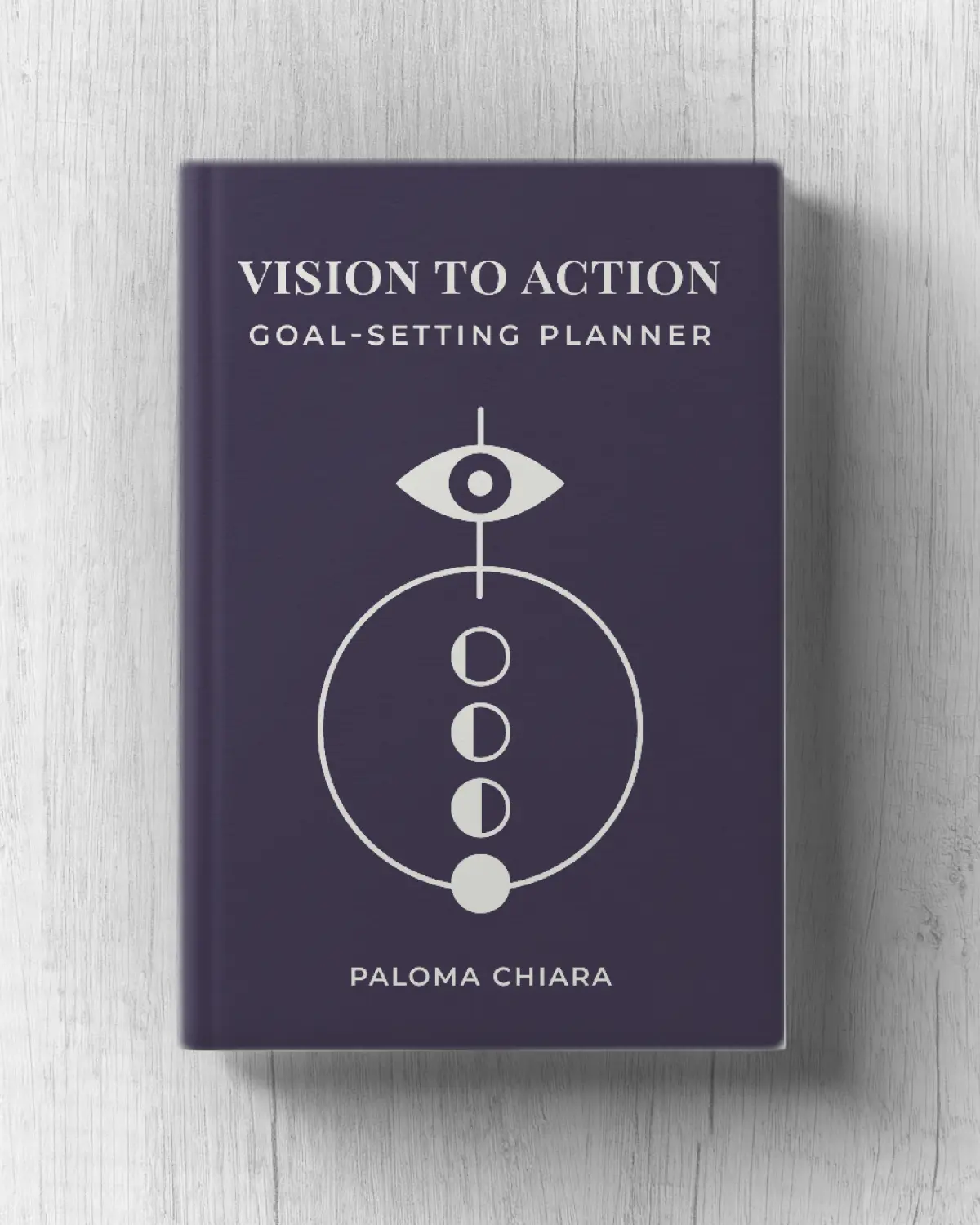
Check out the Vision to Action Planner for only 6$
More info3. Set Clear, Ambitious Goals
Goal-setting is the blueprint for high achievement. Without clear targets, even the most disciplined individual can feel directionless or overwhelmed. High achievers set ambitious but achievable goals that push them to grow, while also being specific enough to track progress. A SMART approach—Specific, Measurable, Achievable, Relevant, and Time-bound—ensures your goals are actionable and meaningful rather than vague aspirations.
Beyond just setting goals, it’s important to create a goal hierarchy that connects daily actions to long-term vision. Large goals can feel daunting unless broken down into manageable steps. For example, a long-term career goal might be publishing a book or reaching an executive position. Medium-term goals would include acquiring skills, networking, or building a portfolio, while short-term goals involve daily writing, learning, or project completion. High achievers understand that consistent, incremental progress compounds over time and that small daily actions are often more powerful than sporadic bursts of effort.
SMART Goals
- Specific: Clearly define the outcome.
- Measurable: Track progress with quantifiable metrics.
- Achievable: Goals should stretch you, but be realistic.
- Relevant: Align with your purpose and long-term objectives.
- Time-bound: Deadlines create accountability.
Goal Hierarchy
- Long-term goals: Big-picture vision (e.g., career milestones, personal mastery).
- Medium-term goals: Steps that bridge long-term and short-term goals.
- Short-term goals: Daily or weekly actionable tasks that keep momentum.
4. Build High-Performance Habits
Habits are the daily behaviors that turn ambition into results. High achievers don’t rely solely on motivation—they engineer routines that make success inevitable. Core habits often include structured mornings, focused work blocks, energy management, and continuous learning. A purposeful morning routine, for instance, primes the mind and body for high performance, helping you start the day with clarity and intention.
Deep work is another cornerstone. High achievers dedicate uninterrupted time to their most important tasks, resisting distractions and multitasking. They also understand the importance of energy management: working with their natural peaks in focus, taking strategic breaks, and using recovery to prevent burnout. Reflection is equally vital; reviewing accomplishments and lessons regularly allows for course corrections and reinforces continuous improvement. Over time, these small but consistent habits compound into extraordinary outcomes, making high achievement a product of design, not luck.
Morning Ritual
- Start with meditation, journaling, or exercise.
- Plan the day by prioritizing most important tasks first.
Deep Work
- Schedule blocks of distraction-free work for high-priority tasks.
- Avoid multitasking—it reduces efficiency and quality.
Energy Management
- Work with your natural energy cycles.
- Take breaks strategically (Pomodoro technique, 90-minute focus blocks).
Continuous Learning
- Dedicate time to skill-building, reading, or courses.
- Learn from mentors, peers, and even competitors.
Reflection & Review
- At the end of each day/week, review accomplishments and adjust plans.
- Identify what worked, what didn’t, and where improvements are needed.
Quiz: What Is Blocking Your Success?
This quick quiz will help you figure out which mental or behavioral pattern might be holding you back from achieving your full potential. Identifying your specific success blocker is the first step toward breaking through to new levels of achievement and fulfillment.
Read each question and choose the answer that feels most true to your situation.
No email or payment is required to complete the quiz and receive your personalized insights.
Once you have your primary success blocker, you have clarity about what’s been holding you back. This awareness is powerful—many people spend years struggling without understanding the specific pattern that’s limiting their progress.
Remember, these patterns aren’t permanent character traits but rather habitual ways of thinking and behaving that can be changed with the right guidance and practice.
If you’re ready to break through your specific blocker and achieve the success you know you’re capable of, send me an email to try out a coaching session. Your breakthrough awaits!
5. Master Emotional and Mental Resilience
High achievers inevitably face stress, uncertainty, and pressure. Developing emotional and mental resilience is critical for sustaining long-term success. This involves cultivating mindfulness, self-reflection, and strategies for managing stress effectively. Practices like meditation or journaling create space for clarity, helping high achievers process challenges rather than react impulsively. Resilience also includes reframing setbacks as opportunities to learn rather than as failures, which maintains momentum and motivation even in difficult periods.
Another key aspect is self-compassion. While high achievers are naturally driven, overly harsh self-criticism can erode performance and well-being. Learning to treat oneself with the same patience and encouragement you’d offer a friend allows you to recover from mistakes faster and maintain motivation over time. Emotional resilience, coupled with strategic thinking and self-awareness, ensures that high achievers can not only survive high-pressure environments but thrive in them.
- Mindfulness & Meditation: Reduce stress, increase focus, and build awareness.
- Journaling: Process emotions, clarify thoughts, and track progress.
- Cognitive Reframing: Turn challenges into opportunities for growth.
- Self-Compassion: Avoid destructive self-criticism; treat setbacks as part of growth.
6. Optimize Productivity Without Burning Out
High achievement isn’t about working longer hours—it’s about working smarter. High achievers focus on maximizing output while protecting energy and mental clarity. This requires intentional time and energy management, rather than simply filling every hour with tasks. Productivity optimization includes prioritizing high-impact activities, reducing distractions, and designing workflows that align with your peak focus periods. Techniques like the Pomodoro method, time-blocking, and batching similar tasks allow high achievers to maintain deep focus without feeling scattered.
Equally important is avoiding overcommitment. Ambitious individuals often say yes to every opportunity, fearing missed chances. But high achievers understand that saying no strategically creates space for what truly matters. Delegation is another key skill: trusting others to handle tasks frees up time for activities that require your unique skills and creativity. By combining strategic focus, energy awareness, and selective effort, high achievers maintain sustainable performance and avoid the all-too-common trap of burnout.
- Prioritize tasks: Use the Eisenhower Matrix (urgent vs. important).
- Delegate effectively: Focus on tasks that truly require your unique skills.
- Limit distractions: Email, social media, and low-value meetings can drain energy.
- Set boundaries: Protect personal time to recharge physically and mentally.
7. Cultivate Meaningful Relationships
The people around you significantly impact your motivation, growth, and resilience. High achievers prioritize building supportive, inspiring networks—including mentors, peers, and collaborators—who challenge them to improve and provide guidance during difficult periods. Relationships are not only sources of knowledge but also emotional support, accountability, and perspective.
High achievers also excel at selective networking. They invest in connections that align with their goals and values, rather than spreading themselves thin. This includes learning from experts in your field, seeking feedback, and surrounding yourself with people who push you toward excellence. Relationships that foster collaboration, innovation, and mutual growth help high achievers reach levels of performance that would be difficult to achieve in isolation. In essence, building the right network amplifies both personal and professional success.
- Build a network of mentors, peers, and supporters.
- Seek accountability partners for ambitious goals.
- Surround yourself with people who challenge and inspire you.
8. Track Progress and Celebrate Wins
Measurement and reflection are critical to sustaining momentum. High achievers don’t rely on intuition alone—they track their progress to ensure consistent growth. This could involve daily journals, digital dashboards, or habit trackers. By monitoring performance, you can identify patterns, recognize obstacles early, and adjust strategies before small issues turn into major setbacks. Measurement also transforms abstract ambitions into tangible results, giving motivation a concrete foundation.
Celebrating wins is equally essential. Small victories—completing a challenging task, reaching a milestone, or mastering a skill—reinforce positive habits and keep motivation high. High achievers understand that progress fuels performance; even small acknowledgments of success contribute to long-term growth. Reflecting on achievements also provides an opportunity to learn from both successes and failures, helping refine strategies for even greater results in the future.
- Use journals, apps, or dashboards to track daily, weekly, and monthly progress.
- Celebrate small victories—this reinforces motivation and builds momentum.
- Adjust strategies as needed rather than stubbornly sticking to failing methods.
9. Avoid Common High-Achiever Pitfalls
High achievers face unique challenges that can sabotage success if left unchecked. Perfectionism, for example, can prevent completion of projects or slow progress, while overcommitting can lead to stress and burnout. Another common trap is neglecting self-care, which diminishes energy and focus over time. High achievers also often struggle with delegation, fearing that others won’t meet their standards, which limits scalability and efficiency.
Awareness is the first step to overcoming these pitfalls. By recognizing tendencies toward overwork, obsessive control, or excessive self-criticism, high achievers can implement proactive strategies to mitigate them. This may include creating boundaries, practicing self-compassion, or developing systems that distribute workload effectively. Avoiding these common traps ensures that ambition becomes a source of sustained growth rather than a cycle of stress and frustration.
- Perfectionism: Delays progress—focus on excellence, not flawlessness.
- Overcommitting: Know when to say no.
- Neglecting self-care: Burnout undermines performance.
- Fear of delegation: Learning to trust others amplifies results.
10. Embrace a Long-Term Perspective
High achievement is a marathon, not a sprint. Sustainable success comes from consistent effort over years, not occasional bursts of productivity. High achievers embrace a long-term perspective, understanding that compounding growth in skills, relationships, and habits leads to extraordinary results over time. This mindset shifts focus from instant gratification to meaningful, enduring progress.
A long-term approach also encourages adaptability and continuous learning. Industries, technologies, and personal circumstances change, and high achievers who remain flexible can pivot strategies while staying aligned with their overarching goals. Patience, perseverance, and resilience are crucial, as growth rarely follows a linear path. By embracing a long-term vision, high achievers can pursue ambitious goals without losing perspective, ensuring their efforts create lasting impact and fulfillment.
- Success is cumulative, built over years of disciplined effort.
- Focus on continuous improvement rather than instant results.
- Maintain curiosity, adaptability, and resilience for lifelong growth.
-
How To Make a Positive Impact in Your Community
Read blogThe word “community” gets thrown around a lot and while we may have a vague understanding of what it means, how many of us truly stop to think about the impact we have on our communities or they have on us? There is so much to be said about them and yet many of us feel disconnected or don’t realize how important it is to be intentional about our relationship to the groups we may belong to. Let’s review what community is, where to find it, and how to make a positive impact on it.
What is Community?
The Merriam-Webster dictionary has three different definitions of community, starting at “a unified body of individuals” and ending with “society at large”. If the dictionary somehow has a specific yet vague definition of what community is, sociology doesn’t help much either. The truth is you make part of not just one but many communities at a time –and that’s kind of the point. Your community can derive from things like religion, ethnicity, race, to where you live, a hobby you have, or an artist you love. Most of the time, our communities go unseen despite the intrinsic and profound connection we may have with them; think of the people you might regularly work with, take public transportation with, or the people that grow your food, empty the garbage bins of your neighborhood, or clean the streets, just to name a few examples. Community shifts and grows with us, it is the group of people that we influence or influence us, whether directly or indirectly.
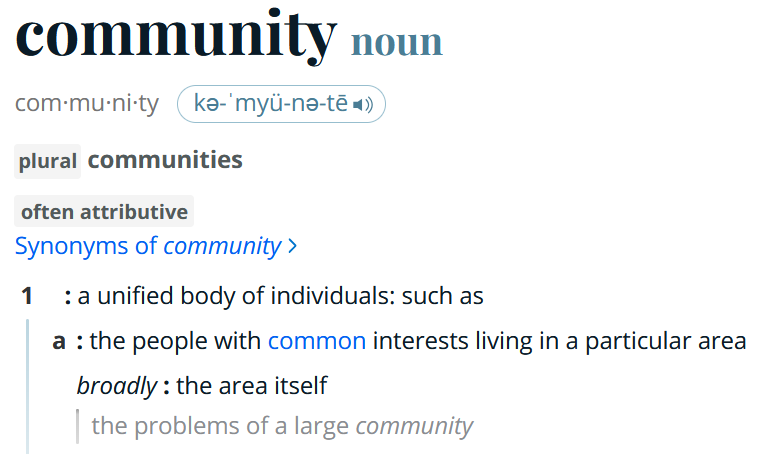
Why Does Community Matter?
You may have heard that humans are “social animals” that are hard-wired for connection. While different people experience different desires to interact with others, the way we affect each other is undeniable. There is extensive research on how caring is not only an evolutionary trait it’s not even limited to humans. We build resilience through community, save each others’ lives after disaster, we change how things are done through community. And the same way we like to be mindful of what we eat and how much we drink, or just how we like to be intentional about our health, so should we be intentional about how we are involved in our communities and the impact we have.
Examples of Intentional Community Members
When we think of what an intentional community member looks like, few embody it better than Mr. Rogers, whose intentional practice of everyday kindness taught generations what it means to care. From taking the time to really listen to children to addressing difficult topics like grief and racism with honesty and gentleness, he showed up for the people who needed most in ways that were relevant. On a very different scale but with the same spirit, the Black Panther Party demonstrated radical community care through programs like free breakfast for children and health clinics among other things. This same principle lives on in everyday people doing everyday acts: parents who organize carpools, neighbors who start community gardens or stock community fridges, barbers who offer free haircuts, or people who simply check in on an elderly neighbor. A lot of it comes down to being a good “neighbor”, but neighbor doesn’t just mean the people you live close to, it can be the people who you more directly impact in your life.
Where to Find Community
Community often begins in the places closest to us. For some, that means investing in our families and nurturing the relationships that directly shape our lives. Stepping beyond our immediate circles, we can find community in public spaces like the local library, where bulletin boards are filled with events, workshops, and volunteer opportunities. You might also discover connection in neighborhood gatherings, local markets, classes, art collectives, faith groups, or sports clubs. The key is presence: showing up, again and again, until you start to recognize people and build bonds.
Of course offline isn’t the only way to connect. In 2020, when COVID first started, having to stay indoors showed us the relevance and possibilities of taking things online. However, online communities have existed since the internet first entered the mainstream media. Our desire to be able to reach each other gave way to many social media networks (long before Facebook, and still after) that changed how we saw each other and used the vocabulary of friendship. Think about it: when else did you ever use the word “unfriend” before social media? Websites like Discord and Mastodon have seen an unmistakable rise in the last five years as people continue to seek community in digital spaces.
Making a Positive Impact
The most important part about creating an intentional positive impact is by being consistent and reliable. Here’s a few things to consider:
- Strengthening emotional intelligence allows us to listen better, respond with empathy, and build trust.
- Asking others what they need and allowing them to lead you in learning to care for them while you learn to negotiate your limits incites community autonomy.
- Small acts like checking in, following through, and sharing your time or skills plant seeds of resilience.
- Investing in the well-being of those around you and actively participate in their lives in a way that suits you both allows us to form bonds.
- Volunteering, mentoring, offering your expertise, or simply being the person others can count on, strengthens bonds and supports mutual aid networks.
- Know your strengths, understand your limits, and set boundaries that keep your care sustainable.
- Study what local and other foreign community leaders are doing and support the cause either locally or digitally to add quality to the numbers.
- Become a community leader by getting the ball rolling on a project that your community might need. Initiative is essential fuel for change. This can look like throwing a block party to get to know the neighbors, hosting a clothing swap, or starting a book club.
- Define what role you can play. There are so many ways you can contribute to different communities, and having a clear understanding of it can feel empowering as well as help you stay consistent.
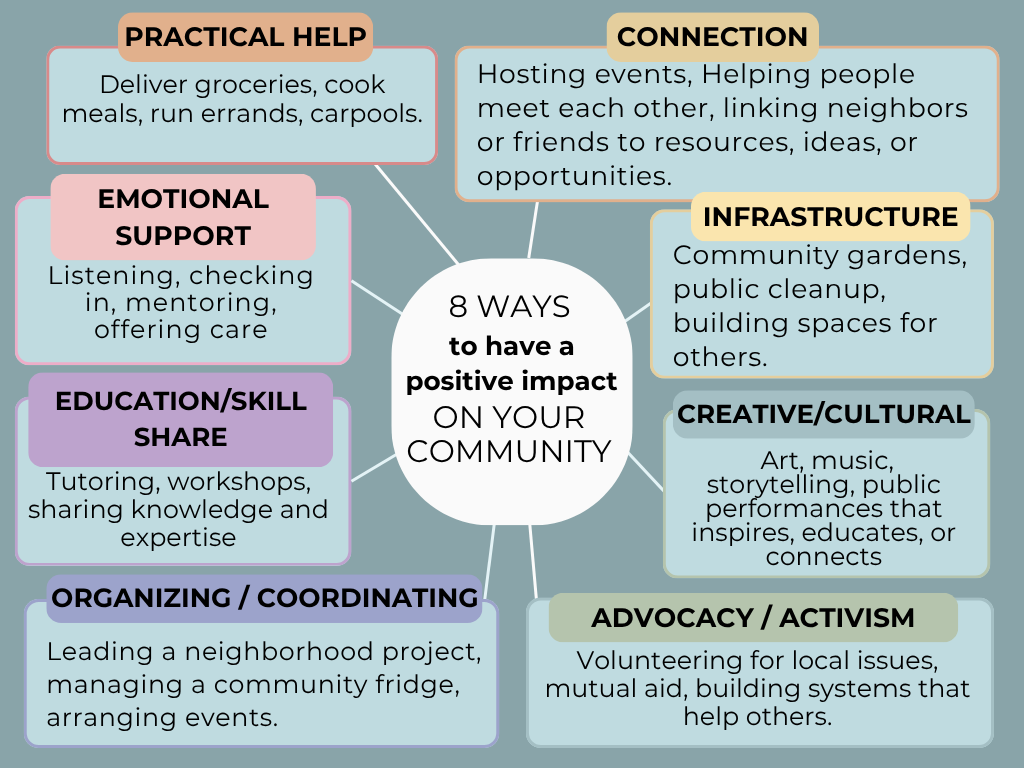
Community Means Committed Participation
Whether we are actively participating in them or not, there are all types of intentional communities with their own agendas happening around us. Being intentional about our impact empowers us and those around us. However, it takes active practice, time, and energy. Community is something we build, nurture, and tend to over time. It asks for awareness, reciprocity, and a willingness to grow alongside others. When we learn to show up – imperfectly, but intentionally – we become part of the crucial work that keeps the world humane. Our communities shape us as much as we shape them. And in choosing to care, we participate in something far bigger than ourselves.
Relevant Reading
- How We Show Up - Mia Birdsong
- The Art of Gathering - Priya Parker
- The Art of Community - Charles Vogl
- Belonging Design Principles (Free PDF) - Ashley Gallegos Cecilie Surasky
- Mutual Aid - Dean Spade
Resources:
- https://www.merriam-webster.com/dictionary/community
- https://sociology.institute/introduction-to-sociology/characteristics-defining-community/
- https://puresociology.com/what-is-community/
- https://www.knowyourmobile.com/fediverse/what-is-the-fediverse/
- https://news.harvard.edu/gazette/story/2025/02/is-social-connection-a-basic-need-like-food-water/
- https://www.frontiersin.org/journals/psychology/articles/10.3389/fpsyg.2020.00199/full#B40
- https://www.researchgate.net/profile/Emma-Stokes/publication/226540253_Effect_of_Snare_Injuries_on_the_Fig-Feeding_Behavior_of_Chimpanzees_of_the_Budongo_Forest_Uganda/links/02e7e529e5726e63fe000000/Effect-of-Snare-Injuries-on-the-Fig-Feeding-Behavior-of-Chimpanzees-of-the-Budongo-Forest-Uganda.pdf
- https://humanresilienceproject.org/guides/community-resilience/
- https://www.nuffieldbioethics.org/wp-content/uploads/Community-engagement-after-Hurricane-Katrina.pdf
- https://www.accessinst.org/blog/the-radical-vision-of-mr-rogers-neighborhood-what-does-it-mean-for-mental-health-and-our-community
- https://www.forbes.com/sites/scotthutcheson/2025/01/28/what-leaders-can-learn-from-mr-rogers-about-the-power-of-kindness/
- https://en.wikipedia.org/wiki/Free_Breakfast_for_Children
- https://pmc.ncbi.nlm.nih.gov/articles/PMC5024403/
- https://mutualaiddisasterrelief.org/

Check out the Vision to Action Planner for only 6$
More infoQuiz: What Is Blocking Your Success?
This quick quiz will help you figure out which mental or behavioral pattern might be holding you back from achieving your full potential. Identifying your specific success blocker is the first step toward breaking through to new levels of achievement and fulfillment.
Read each question and choose the answer that feels most true to your situation.
No email or payment is required to complete the quiz and receive your personalized insights.
-
What Is the “Winter Arc” Challenge?
Read blogWhat Is the “Winter Arc” Challenge?
The phrase “winter arc” has taken over social media in the last couple of years, but it’s more than just a catchy buzzword. At its core, the winter arc challenge is about using the colder, quieter season to intentionally work on yourself. Just like characters in a story have arcs of growth, struggle, and transformation, a “winter arc” is your personal storyline where you commit to becoming a stronger, more disciplined version of yourself.
Let’s break it down question by question.
What Does It Mean to Be in a Winter Arc?
To be in a winter arc means deliberately entering a season of self-improvement during the colder months. Winter is a natural metaphor for retreat, reflection, and preparation. When everything outside slows down — the days are shorter, social events are fewer, and people tend to stay indoors — the winter arc asks you to use that time for building yourself from within.
This could look different for everyone. For some, it’s about mental clarity: journaling, meditating, and cutting off toxic habits. For others, it’s about discipline: waking up early, studying hard, and staying consistent in routines. The idea is that while everyone else might “hibernate” passively, you’re building momentum so that by spring, you emerge stronger, sharper, and more aligned with your goals.
Why Is the Winter Arc So Popular?
The winter arc has gained popularity because it taps into two powerful cultural ideas: storytelling and self-improvement. Social media thrives on narrative, and the term “arc” makes your personal growth feel cinematic. Instead of saying “I’m working on myself this winter,” saying “I’m in my winter arc” makes it sound like you’re the main character of your own story — and who doesn’t love that?
On a deeper level, winter already feels symbolic. It’s a season where many people feel stagnant or even struggle with seasonal depression. The winter arc flips that narrative, turning what could be a season of decline into one of progress. It’s also perfectly timed with the new year, when people naturally reflect on resolutions and long-term goals. Put all that together, and the winter arc becomes both a trend and a mindset that resonates across cultures and platforms.
Who Invented the Winter Arc?
There isn’t a single person who can be credited with inventing the winter arc. Like many internet trends, it evolved organically. The use of “arc” to describe phases in life comes from anime, storytelling, and fan culture, where characters go through arcs of growth or transformation. Online, people started applying it to real life: villain arc, healing arc, soft arc, etc.
The winter arc likely spread on TikTok and Twitter around the same time people were looking for motivation during the colder months. Influencers and everyday users began documenting their routines under the label of “winter arc,” and the idea snowballed. So while it doesn’t have one inventor, it has many contributors who helped turn it into a shared cultural phenomenon.
Where Did the Term Winter Arc Come From?
The root of the term is the word “arc.” In stories, an arc is the journey of a character: their struggles, challenges, and eventual transformation. Online culture picked this up as a way to frame real-life growth. Just like a hero in a story has a redemption arc or a training arc, regular people began describing their personal journeys in the same way.
Winter, of course, was the perfect season to attach to the idea. In mythology and literature, winter often symbolizes death, stillness, and waiting. But it also carries themes of rebirth and preparation. By combining the concept of “arc” with “winter,” the term created a vivid metaphor: a time where you disappear into the cold and emerge changed.
What Does Winter Arc Mean in the Gym?
Although this post focuses on the philosophical side, it’s worth mentioning how the winter arc is often used in fitness. For gym-goers, the winter arc is often the “bulking season,” where the focus is on eating more and training heavier to build strength. The idea is that you use the season to grow, then “cut” in the spring for a leaner summer physique.
This interpretation overlaps nicely with the self-improvement angle: both see winter as a time to build — whether it’s building muscle, building habits, or building mental toughness.
How to Start Your Winter Arc
Starting a winter arc doesn’t mean overhauling your entire life overnight. It’s about creating intentional habits that align with your goals. Here’s how:
- Define your vision. Ask yourself: who do I want to become by spring? More disciplined? Healthier? More confident?
- Set clear goals. Break your vision into concrete actions: e.g., journal 10 minutes a day, exercise three times a week, cut out mindless scrolling.
- Design your environment. Winter can feel isolating, but that’s also its strength. Create a cozy, distraction-free space that supports your goals.
- Build consistency. The arc isn’t about a single dramatic change but small, daily actions that accumulate over weeks.
- Document your journey. Journaling or vlogging not only keeps you accountable but also makes your “arc” feel like a real narrative you can look back on.

Check out the Vision to Action Planner for only 6$
More infoHow Long Is the Winter Arc?
Traditionally, the winter arc lasts the duration of winter — roughly three months, from December through February (or November through March depending on your climate). But it’s not a fixed rule. Some people start as early as fall to get ahead, while others extend their arc until spring if they’re still chasing their goals.
The key isn’t the exact timeframe, but the mindset: committing to a season of transformation rather than a quick two-week challenge. By giving yourself several months, you allow time for real habit formation and noticeable change.
Is the Winter Arc Good or Bad?
Like most self-improvement trends, the winter arc can be both good and bad depending on how you approach it.
The good:
- It encourages discipline during a season when people often lose motivation.
- It creates a sense of narrative, making personal growth feel exciting rather than tedious.
- It provides structure and purpose during darker months.
The bad:
- Social media can make it competitive, leading people to compare their “arc” to others.
- If approached with perfectionism, it can cause burnout or guilt.
- It may encourage isolation, even though people actually improve faster with the right support.
Ultimately, the winter arc is good if it’s about sustainable growth and self-discovery. It turns harmful if it becomes a pressure-filled performance.
Can You Fail the Winter Arc?
Failure in the winter arc is subjective. You can “fail” if you give up completely or abandon your goals without reflection. But setbacks and mistakes aren’t failure — they’re part of the arc. Remember: in stories, characters stumble before they transform.
The real failure is refusing to learn. If you fall off your schedule but get back up, you’re still in your arc. If you quit because you think you “ruined it,” then you’ve missed the point.
What Are the Rules of a Winter Arc?
There are no official rules, but common principles include:
- Consistency over intensity. Small habits done daily beat extreme efforts that fizzle out.
- Intention over appearance. Your arc is about growth, not showing off online.
- Discipline over mood. You won’t feel motivated every day — that’s where discipline carries you.
- Reflection over results. Tracking progress and learning from mistakes matters more than perfection.
Think of these as guiding principles rather than rigid rules. Every winter arc is personal and unique.
What Does the Winter Arc Schedule Look Like?
There’s no one-size-fits-all winter arc schedule, but a sample could look like this:
- Morning: Wake up early, journal or meditate, set intentions for the day.
- Daytime: Focused work or study sessions, limiting distractions.
- Afternoon: Exercise, skill-building, or personal projects.
- Evening: Wind down with reading, reflection, or gratitude journaling.
- Weekly focus: Meal prepping, digital detoxing, or deep cleaning to maintain order.
The point isn’t to copy someone else’s exact routine but to craft a structure that keeps you disciplined, productive, and aligned with your goals during the season.
Quiz: What Is Blocking Your Success?
This quick quiz will help you figure out which mental or behavioral pattern might be holding you back from achieving your full potential. Identifying your specific success blocker is the first step toward breaking through to new levels of achievement and fulfillment.
Read each question and choose the answer that feels most true to your situation.
No email or payment is required to complete the quiz and receive your personalized insights.
Once you have your primary success blocker, you have clarity about what’s been holding you back. This awareness is powerful—many people spend years struggling without understanding the specific pattern that’s limiting their progress.
Remember, these patterns aren’t permanent character traits but rather habitual ways of thinking and behaving that can be changed with the right guidance and practice.
If you’re ready to break through your specific blocker and achieve the success you know you’re capable of, send me an email to try out a coaching session. Your breakthrough awaits!
Media & Press
Still waiting for the 'perfect time'?
Email me what you'd do if you stopped making excuses. We'll work backwards from there.
Let's start
The App Made To Sync Your Lifestyle to Your Menstrual Cycle.
A solution for women who are looking to keep track of what they sync to their cycles, such as fitness, diet, etc. by adding it to a calendar that also predict their phases.
Learn more



